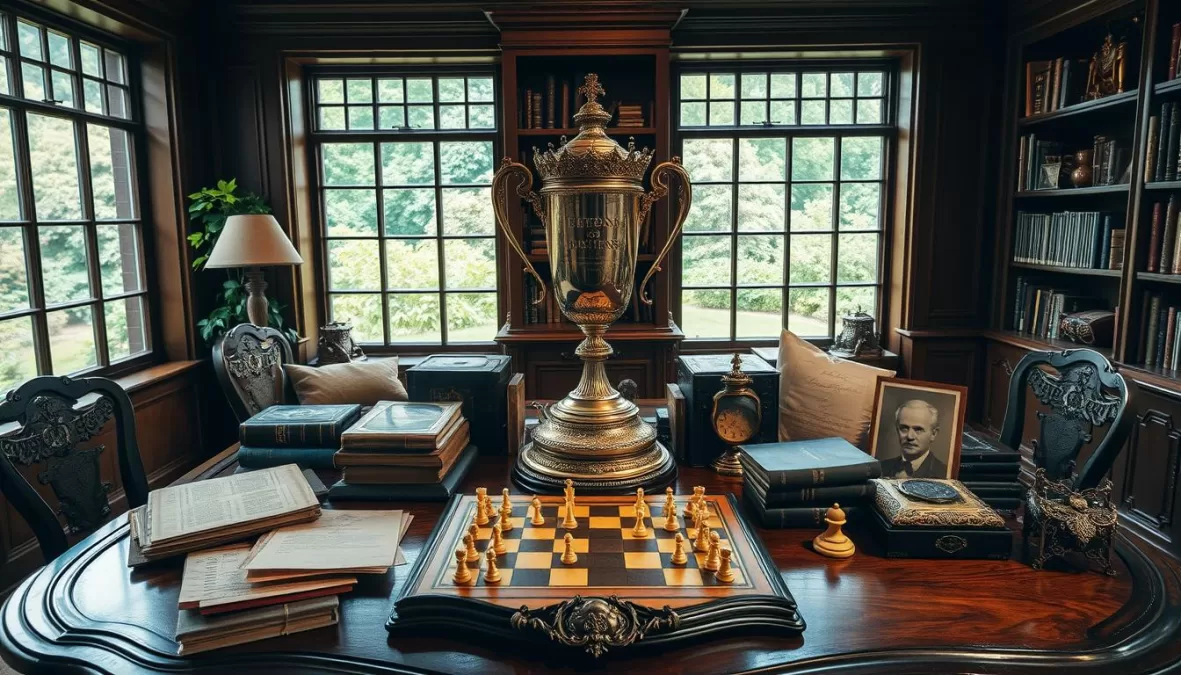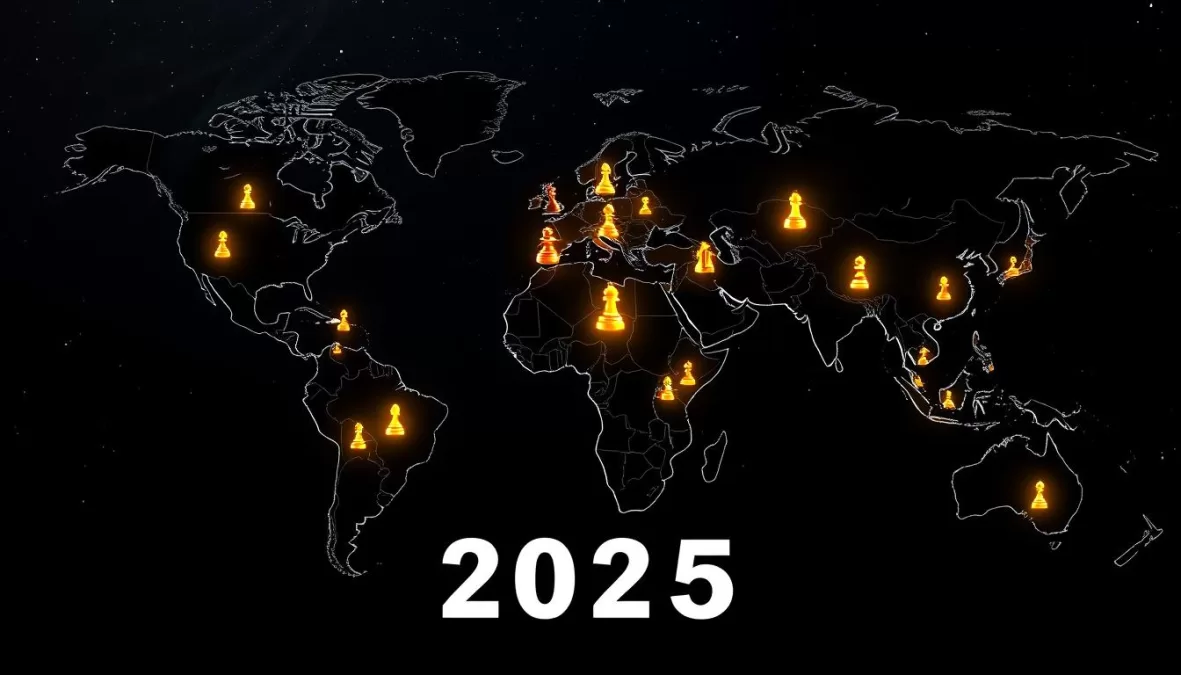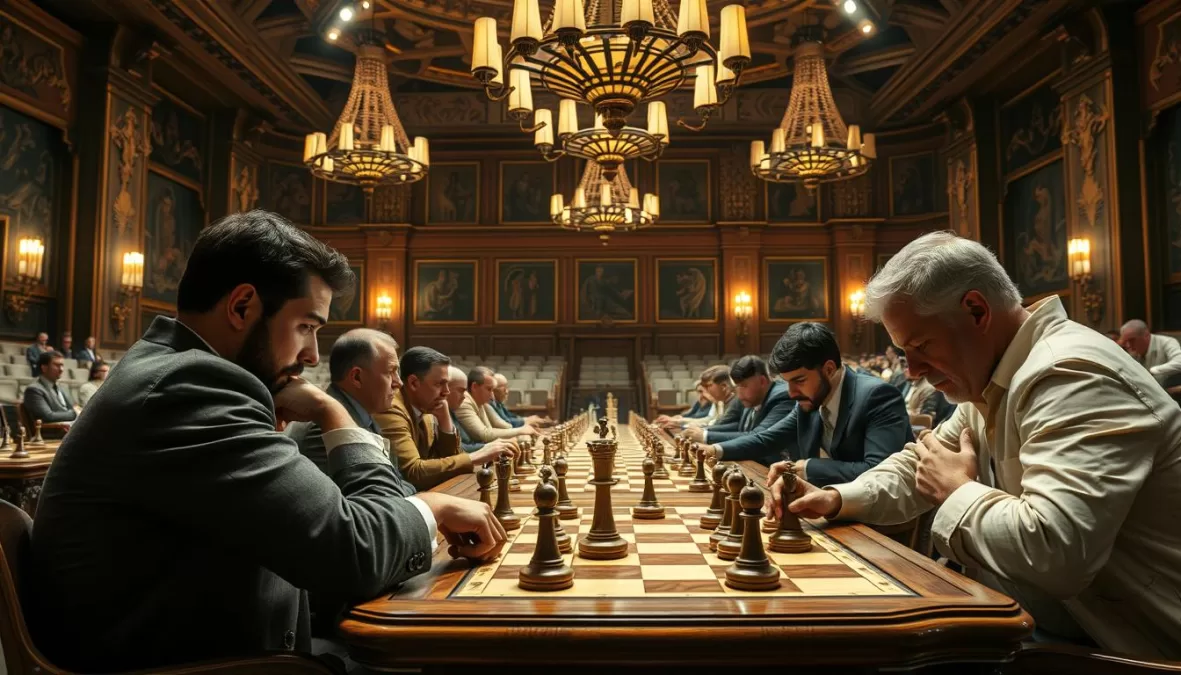The chess landscape in 2025 showcases a thrilling mix of seasoned champions and emerging talents. Magnus Carlsen remains a dominant force, holding the highest Elo rating of 2831 despite fewer tournament appearances. His strategic brilliance continues to set the standard for excellence.
India’s influence grows stronger, with three prodigies securing spots in the global top 15. Names like Gukesh D and Praggnanandhaa R highlight this shift, proving the country’s rising prominence. Meanwhile, players like Hikaru Nakamura and Fabiano Caruana maintain their elite status, keeping competition fierce.
FIDE’s latest rankings reveal key trends, including a youth movement and evolving playstyles. Regional diversity also stands out, with talent emerging from multiple continents. This dynamic environment makes 2025 an exciting year for enthusiasts.
Key Takeaways
- Magnus Carlsen leads with an impressive 2831 Elo rating.
- India’s rising stars dominate with three players in the top 15.
- FIDE’s January 2025 rankings highlight global shifts.
- Youthful energy is reshaping competitive strategies.
- Regional diversity enriches the game’s evolution.
The Elite: Top 3 Chess Players Dominating 2025
Three names stand above the rest in competitive chess this year. Their unique styles and relentless drive shape the game’s future. Below, we explore what makes them unstoppable.
Magnus Carlsen: The Unshakable Champion
With an Elo rating of 2831, Carlsen remains the benchmark for excellence. His 2025 Tata Steel victory proved his adaptability despite fewer appearances. “He sees three moves ahead when others see one,” notes a fellow grandmaster.
Hikaru Nakamura: Blitz and Rapid Mastery
Nakamura’s 2777 Elo hides his true strength: speed. He dominates blitz formats, leveraging his aggressive playstyle. Fans adore his online streams, where he breaks down complex tactics effortlessly.
Gukesh D: India’s Rising Prodigy
At 18, Gukesh made history as the youngest World Championship challenger. His 78% win rate with the Sicilian Defense stuns opponents. In 2024 alone, he surged 112 Elo points—a feat unmatched by peers.
“Gukesh’s fearlessness mirrors a young Kasparov. He’s not just playing; he’s rewriting rules.”
| Player | Elo (2025) | Specialty | Milestone |
|---|---|---|---|
| Magnus Carlsen | 2831 | Endgame precision | 5-time World Champion |
| Hikaru Nakamura | 2777 | Blitz/Rapid | #1 Speed Chess 2024 |
| Gukesh D | 2777 | Sicilian Defense | Youngest Challenger |
These chess players exemplify how diverse paths lead to greatness. Carlsen’s consistency, Nakamura’s speed, and Gukesh’s boldness define this year’s competitive spirit.
Top 10 Chess Players in the World 2025
Competitive chess in 2025 is defined by tactical mastery and bold innovations. Beyond the top three, two players stand out for reshaping the game’s dynamics. Their contrasting styles highlight chess’s evolving complexity.
Fabiano Caruana: The Tactical Precisionist
Fabiano Caruana’s 2801 Elo reflects his razor-sharp calculations. Though he dropped 20 points early in 2025, his rebound at the Tata Steel Masters proved his resilience. “He turns slight advantages into victories like no one else,” notes a rival grandmaster.
His middlegame accuracy remains unmatched, with a 78% win rate in balanced positions. Caruana’s ability to exploit microscopic weaknesses keeps opponents on edge.
Erigaisi Arjun: The Strategic Disruptor
Erigaisi Arjun’s leap from #27 to #4 stunned the chess world. His “positional storm” strategy—flooding the board with unexpected pawn pushes—has baffled elite players. With 85% wins in closed games, he’s a master of controlled chaos.
At 2801 Elo, he’s India’s first to cross this threshold. Arjun also mentors young talents in India’s national training program, blending innovation with legacy-building.
“Arjun doesn’t just play; he engineers victories. His games feel like solving a puzzle backward.”
- Historic climb: Gained 5 rating points in April 2025, solidifying his top-5 status.
- Global impact: Key to India’s rise, with three players now in the top 15.
- Versatility: Won 9 classical games in December 2024, including against GMs Pechac and Kazakouski.
Young Guns Shaking Up the Rankings
A new wave of young talent is redefining competitive chess in 2025. These prodigies blend fearless creativity with technical precision, pushing veterans to adapt. Their rapid climbs and innovative strategies make this year’s tournaments unforgettable.
Praggnanandhaa R: The Teenage Sensation
At just 19, Praggnanandhaa R holds a 2768 Elo rating and ranks #6 globally. This teenage player defies expectations with a 65% win rate against top-10 opponents. His 18 games in December 2024 alone showcased his relentless growth.
Earning the Grandmaster title at 12, he’s now a symbol of India’s chess revolution. Praggnanandhaa’s ability to convert slight edges into victories stuns analysts. “He plays like he’s got nothing to lose—even when everything’s at stake,” says a FIDE commentator.
Nodirbek Abdusattorov: Uzbekistan’s Pride
Nodirbek Abdusattorov made history with a 500-point Elo surge in two years. His “Central Asian Attack” opening baffles elite rivals, blending aggression with control. The past year saw his rapid rise to #8 worldwide.
Beyond the board, he leads Uzbekistan’s state-backed chess academies. His 78% win rate in rapid games proves his adaptability. Key achievements:
- First to qualify for Candidates via continental events.
- Mentors 200+ juniors in Tashkent’s national program.
- Won 9 consecutive classical games in late 2024.
“Nodirbek doesn’t just win—he transforms how we think about openings.”
Notable Chess Records and Milestones
From lightning-fast wins to marathon battles, chess games test skill and stamina. Records reveal the extremes of human focus, from blitzkrieg victories to grueling 20-hour matches. Here are the feats that redefine what’s possible.

Shortest Game: A 4-Move Wonder
The infamous Fool’s Mate ends in just two moves (1.g4 e5 2.f3?? Qh4#). It’s a rare blunder even among beginners. More common are resignations by grandmasters before move 10, like Anand’s 6-move loss in 1988.
Longest Game: 269 Moves of Endurance
In 1989, Nikolić and Arsović battled for 20 hours across 269 moves—a test of physical and mental grit. The game ended in a draw due to the 50-move rule, which forces a draw if no progress is made.
“Long games aren’t just about skill; they’re about outlasting your opponent’s willpower.”
Modern rules allow exceptions to the 50-move limit in rare cases, like certain endgames. Players now train with hydration and nutrition plans for such marathons.
| Record | Details | Year |
|---|---|---|
| Shortest decisive game | Fool’s Mate (2 moves) | N/A |
| Longest FIDE-rated game | 272 moves (Fellowes vs. Lalić) | 2024 |
| Longest World Championship game | 136 moves (Carlsen vs. Nepo) | 2021 |
These milestones shaped chess clocks and tournament schedules. Digital tools now help players analyze marathon games move-by-move, ensuring history’s lessons aren’t lost.
Top 10 Chess Players in India
India boasts some of the most formidable chess talents today. With a perfect blend of experience and youthful energy, its players dominate global rankings. Their unique styles and dedication continue to inspire millions.
Viswanathan Anand: The Eternal Pioneer
At 55, Anand remains India’s chess icon with a 2750 Elo rating. The five-time World Champion pioneered India’s rise in the game. His 2024 victory at the Tata Steel Rapid proved age is just a number.
Beyond the board, he mentors young talents through rural development programs. “Anand doesn’t play chess—he breathes it,” notes a former opponent. His legacy includes:
- First Indian Grandmaster (1988)
- Peak rating of 2819 (8th highest ever)
- Key architect of India’s Olympiad gold-winning teams
Aravindh Chithambaram: The Stealth Strategist
From #147 to #23 globally in 18 months, Chithambaram’s climb stuns experts. His 2726 Elo reflects a disciplined approach—playing fewer games but winning 85% with white pieces.
He avoids mainstream openings, favoring his signature “Stealth Strategy.” This unpredictability earned him spots on India’s Olympiad team and rural coaching initiatives. December 2024 saw him dominate two critical matches.
“Aravindh proves that quiet consistency can roar louder than flashy tactics.”
Regional Powerhouses: Global Chess Trends
Chess power dynamics are shifting globally, with new regions rising to prominence. Asia now claims 60% of the top 100 players, led by India’s seven grandmasters in the top 50. Uzbekistan follows closely with three juniors breaking into the top 20.

The United States is experiencing a collegiate chess boom. Over 200 universities now offer scholarships, creating pathways for young talents. This system has produced three new American grandmasters in 2024 alone.
Africa celebrates its first grandmaster training center in Nigeria. The Lagos facility has already identified five potential world-class players. “This changes everything for African chess,” notes a local coach.
- Scandinavia’s influence wanes post-Carlsen era, with only two players in the top 100
- Eastern Europe embraces AI-assisted training, revolutionizing opening preparation
- India’s government-backed academies produce record numbers of young masters
These changes reflect in recent rankings. Traditional powerhouses must adapt to stay competitive against emerging nations. The chess world is becoming more diverse than ever.
| Region | Top 100 Players | Notable Change |
|---|---|---|
| Asia | 60 | +12 since 2020 |
| Europe | 28 | -8 since 2020 |
| Americas | 9 | +3 since 2020 |
| Africa | 3 | First entries since 2023 |
“The map of chess excellence is being redrawn. Tomorrow’s champions will come from places we least expect.”
This geographical shift impacts tournament structures and training methods worldwide. More nations now have a place at chess’s top table, enriching the game’s future.
What Makes a Chess Champion in 2025?
Modern chess mastery blends human intuition with technological precision like never before. The game has evolved beyond memorized openings—today’s elite rely on AI, neuroscience, and esports tactics to stay ahead.
Hybrid human-AI preparation is now standard. Over 90% of top-ranked players use neural networks to analyze millions of positions. Tools like AlphaZero clones identify weaknesses in real-time, turning training into a data-driven science.
Key innovations shaping champions:
- Neuroplasticity regimens: Brain-training apps improve pattern recognition, with studies showing 20% faster decision-making.
- Esports-inspired conditioning: Reaction drills and stress simulations mimic high-pressure tournaments.
- Multidisciplinary teams: Nutritionists optimize focus, while sports psychiatrists combat burnout.
“The 2025 champion isn’t just a player—they’re the CEO of their own performance machine.”
Even tournament structures adapt. Faster time controls test stamina, while global circuits demand year-round peak performance. “You can’t just be good at chess anymore,” admits a rising grandmaster. “You need the resilience of an athlete and the adaptability of a startup founder.”
Conclusion
Global shifts and fresh faces mark this year’s chess evolution. The game thrives on young prodigies and strategic innovations, with India leading the charge. As 2026 approaches, eyes turn to Gukesh’s World Championship defense and a fierce Candidates Tournament.
New FIDE rating calculations could reshape the world rankings, rewarding consistency over flashy wins. Rising stars like Dardha and Maurizzi hint at future rivalries, blending tradition with modern tactics.
From esports events to grassroots growth, chess’s appeal spans continents. This list of talents proves the game isn’t just alive—it’s rewriting its own legacy.





